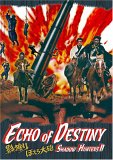| Reviews & Columns |
|
Reviews DVD TV on DVD Blu-ray 4K UHD International DVDs In Theaters Reviews by Studio Video Games Features Collector Series DVDs Easter Egg Database Interviews DVD Talk Radio Feature Articles Columns Anime Talk DVD Savant Horror DVDs The M.O.D. Squad Art House HD Talk Silent DVD
|
DVD Talk Forum |
|
|
| Resources |
|
DVD Price Search Customer Service #'s RCE Info Links |
|
Columns
|
|
|
Echo of Destiny: Shadow Hunters II
Shadow Hunters Jubei (Ishihara), Moonlight (Mikio Narita), and Sunlight (Ryohei Uchida) - masterless samurai hired to combat the ninja spies working on behalf of the Shogunate, they looking for any excuse to destroy rich clans and take possession of their property - continue their lonely, bloody crusade. This time the Shadow Overseer (Tetsuro Tamba in a brief cameo) dispatches Domoto Mukaku (Yoshi Kato), newly-appointed master of the Shogunate Secret Service, to crush the trio's mission to transport a powerful cannon, called "Shikainami" and entrusted to the Mori Igamuri clan. He's accompanied by Maki (Maki Carousel), a crafty female ninja, and about 50 highly disposable ninja warriors.
Joining the Shadow Hunters in their task is samurai Bessho (Kenji Sahara), clan representative, and Miya (Junko Natsu), daughter of the elderly gunsmith who made the cannon and regards it as his life's work. Miya is attracted to Jubei but betrothed to Bessho -- on the condition that he safely sees the cannon to its destination.
Shadow Hunters II is passable but undistinguished entertainment. With its too contemporary, under-nourished score, cheap set design and occasional production sloppiness, it has more the air of a Japanese TV program than the great chanbara adventures of the 1960s that it anemically emulates. There's a teeny bit more story and less showy action this time, which wouldn't be a bad thing if there had been some effort to expand on the characterizations introduced in the previous film, but instead there's even less back-story and interaction among the Shadow Hunters than before.
Instead, we get the same deadpan reflections after each bloody fight ("And so, heaven turns to hell") and cliched soliloquies: "We are the roving stray dogs," Jubei tells Miya, "We shadow hunters have forsaken our past," etc., etc.
Perhaps feeling a bit desperate, Shadow Hunters II ups the ante slightly with a bit more blood and nudity than before. Swords are shoved down throats and slash eyeballs and the like, though not to the degree of Toei's even more violent thrillers of the same period (Battles without Honor and Humanity, Sex & Fury, Female Convict Scorpion: Jailhouse 41, all much superior). One showy scene has Jubei relaxing in a hot spring where a half-dozen beautiful naked women suddenly ambush him. The sequence isn't logical (where did the naked girls hide their weapons?) though few would complain about this.
As before, only Ryohei Uchida's Sunlight, a lusty, joking rogue of a ronin, provides any relief from the by-the-numbers chanbara dreariness. In Shadow Hunters II he matches wits with female ninja Maki, energetically played by transsexual singer Maki Carousel. As seems to be the norm for such performers in Japanese movies, Maki's transgenderedness doesn't factor into the story at all. She's simply a female ninja, and her seduction of Sunlight played without any hint of irony, though Carousel was certainly well-known. Like Akihiro Miwa (Kinji Fukasaku's Black Lizard) and Peter (Akira Kurosawa's Ran), Maki Carousel remains a fixture on Japanese television today.
Japanese monster movie fans will also note the appearance of Kenji Sahara, the actor long associated with the genre for his starring roles in Rodan (1956), The Mysterians (1957), and the TV series Ultra Q (1965).
Video & Audio
Echo of Destiny: Shadow Hunters II is presented in its original CinemaScope format in a clean 16:9 transfer that's free of damage though its source element is a bit weak on color and at times appears rather squeezed at the extreme edges of the frame, though this may be due to the anamorphic camera lenses used during filming rather than with the digital transfer. The Japanese mono track is fine while the English subtitles, despite the usual lapses into contemporary slang ("No way!"), are excellent with intelligent use of multi-colored text so that viewers can better follow some of the faster-paced dialogue. Full and Limited Subtitles are offered, the former helpfully annotating some of the less familiar Japanese and period terms.
Extra Features
As with Shadow Hunters, Trailers are included for both pictures as well as the unrelated Demon Spies (1974). All are presented in 4:3 letterboxed format, but they are subtitled and complete with text and narration.
Both the Program Notes and Image Gallery, while good, would work better if the material could be gone through at the viewer's pace via step frames, rather than as it's presented here.
Parting Thoughts
Only those looking for more Shadow Hunter adventures need apply. The film is okay as bottom-of-the-bill entertainment but little more than that, a late entry into a genre then in the late autumn of its popularity.
Stuart Galbraith IV is a Kyoto-based film historian whose work includes The Emperor and the Wolf - The Lives and Films of Akira Kurosawa and Toshiro Mifune and Taschen's forthcoming Cinema Nippon. Visit Stuart's Cine Blogarama here.
|
| Popular Reviews |
| Sponsored Links |
|
|
| Sponsored Links |
|
|
| Release List | Reviews | Shop | Newsletter | Forum | DVD Giveaways | Blu-Ray | Advertise |
|
Copyright 2024 DVDTalk.com All Rights Reserved. Legal Info, Privacy Policy, Terms of Use,
Manage Preferences,
Your Privacy Choices | |||||||













